- Home
- Kelley Armstrong
City of the Lost: Part Three
City of the Lost: Part Three Read online
PUBLISHED BY RANDOM HOUSE CANADA
Copyright (c) 2015 K.L.A. Fricke Inc.
All rights reserved under International and Pan-American Copyright Conventions. No part of this book may be reproduced in any form or by any electronic or mechanical means, including information storage and retrieval systems, without permission in writing from the publisher, except by a reviewer, who may quote brief passages in a review. Published in 2015 by Random House Canada, a division of Random House of Canada Limited, a Penguin Random House company. Distributed in Canada by Random House of Canada Limited, Toronto.
www.penguinrandomhouse.ca
Random House Canada and colophon are registered trademarks.
Armstrong, Kelley, author
City of the lost : part three / Kelley Armstrong.
eBook ISBN 978-0-34581617-7
Cover design by Terri Nimmo
Image credits: Foxes (c) Potatpov Alexander / Shutterstock; skulls (c) Korinoxe / Dreamstime
v3.1
Contents
Cover
Title Page
Copyright
Previously in City of the Lost
Chapter One
Chapter Two
Chapter Three
Chapter Four
Chapter Five
Chapter Six
Chapter Seven
Chapter Eight
Chapter Nine
Chapter Ten
Chapter Eleven
Chapter Twelve
Chapter Thirteen
About the Author
Previously, in City of the Lost...
To protect Diana from her vengeful ex, Casey strikes a deal with Rockton's enigmatic and short-tempered sheriff, Eric Dalton. Together, Casey and Diana successfully disappear to the remote town.
When she gets there, Casey learns that Rockton may need her just as much as she needs it--a man's been murdered, and she's the new detective in town.
Before she's even had time to take a tour of the place, Isabel, the owner of a local bar, whisks her away to break up a fight. Mid-brawl, Eric arrives and arrests Jerry Hastings, a man suspected of making Rydex, the powerful new drug sweeping the isolated community.
Casey soon learns that not everyone in Rockton is there for a good reason. Harry Powys--the murder victim--had once performed illegal organ transplants, often killing his patients. Powys had actually paid off council members so he could hide from the consequences in Rockton. To make it more confusing, an autopsy reveals that Powys may have been killed--and dismembered--by hostile cannibals.
But Casey has no time to process these troubling developments. Hastings has also gone missing, and Casey, Eric, and the deputy, Will Anders, embark on a manhunt in the surrounding forest. When Casey finds a skull and two bloodied legs nailed to a tree, she knows one thing for sure: A killer is loose in Rockton.
One
I only get a few hours' sleep after our manhunt, and I'm awake by the time the sun's up. I make breakfast before I head out. It's simple fare: toast and a hard-boiled egg. Well, actually, the toast is just bread with peanut butter after I burned two slices trying to brown them on the wood stove. I planned to have a fried egg, but that seemed to be pushing my luck. Figuring out the French press coffee maker had been tough enough, so I just used the leftover water for boiling my egg.
Fortunately, between what Anders has said and what Dalton explained on the drive, my poor camp-cook skills wouldn't be a serious drawback in Rockton. There are three restaurants plus a place that does takeout only. That's not so much a matter of convenience as conservation of resources--you'll waste less buying a precooked meal for one than cooking for one. The chefs are also more flexible and more skilled at making the substitutions necessary under these conditions.
Anders says the restaurant food is reasonably priced. Just don't expect the menu to be vast. Or to find the same thing on it from one day to the next. Again, it's a matter of availability and conservation. Right now, blueberries are just ending their local season, so I have a box on my counter, but in another week the only way I'll be able to get them is in jam, which the local cooks are madly bottling as the picking expeditions clear all nearby patches.
I finish my breakfast, and I'm at the office before nine. I figure Dalton will put some time in before he picks me up at ten, and I'm like the little girl who chases after her big brothers to prove she can do anything they can. I spent my youth refusing to live up to the standards set by my parents and my sister, and ironically, I spend my adult life chasing my colleagues. At least here I have a chance, so I pursue my goals with a childhood of repressed ambition fuelling my fire.
I'm making coffee when Dalton walks in just past nine. I get a "Fuck" for my efforts.
"I was awake," I say, "and I figured you'd stop by here and get some work done before you picked me up."
"When'd you arrive?"
"Ten minutes ago."
He grunts at that, and maybe he just doesn't want me overdoing it ... or maybe I'm not the only one with a competitive streak. Either way, he carries his coffee out onto the back deck. I pour the rest of the pot into a thermos--there's no hot plate here to keep it warm. Then I take my mug and follow.
"Can I talk to you?" I ask as he settles into his chair.
"What's stopping you?"
"When you come out here, you seem to want quiet."
He shrugs. "You can talk. If I don't want to listen, I'll tell you to go away."
My lips twitch. "Some people might take offence at that."
"Then let's hope you aren't one of them, or you're going to spend most of your time here being offended."
I give him a full smile for that, and he tilts his head, as if trying to figure out exactly what prompted it.
"If you're going to talk, talk," he says. "Once this mug's empty, we hit the trails. It'll be a full day of searching."
I walk to the railing. I don't sit in front of him--I have a feeling that'd be a little too close for both of us. But I perch on the corner of the railing, and he looks over, assessing again. I feel as if he processes data like a computer, detecting and analyzing every nuance. She's smiling. She's sitting on the railing instead of the deck. Is that good?
It is. It means I'm relaxing and settling in. Yet there's a wary look in Dalton's eyes, as if he accepts nothing at face value, always searching for deeper meaning, potentially negative.
"I took a quick look through the case files this morning--" I begin.
"I thought you just got in."
"At ten to nine. I started the water and then flipped through the files to check on something. I was looking at the cases of other attacks. Specifically, how close they were to the town and the level of violence involved. The other bodies were found several kilometres in. Powys was barely one, and the level of violence was a huge escalation."
"Yep." That's all he says. Then he drinks more coffee.
"Have there been problems with the, uh, hostiles lately? Could this be a response to a provocation?"
I'm expecting him to snap back that no provocation would justify cutting a man off at the knees--literally. But he says, "No," and continues drinking.
"Is it possible the death was staged?" I ask. "That someone in town did it and is trying to blame these hostiles?"
"Yes." The answer comes without hesitation.
"You've already considered this," I say. "Were you going to discuss your thoughts with your new detective?"
"Sure. If you didn't bring it up. Gonna give you a chance to prove you aren't an idiot first."
"Thanks."
He nods, accepting the gratitude without seeming to catch the sarcasm. He's draining his coffee, and I'm struggling to pick through my thoughts and choose t
he best question before my window evaporates, but before I can, he says, "The thing you need to understand about the hostiles is that they're animalistic."
"Brutally violent, you mean."
He swings his gaze my way; a laser beam that slices through me like I've misstepped in a high-tech heist.
"Do you know anything about animals, detective? Predators?"
I think fast. "Yes, they ... Oh, okay. When you said animalistic, I took that colloquially. You mean literally. That they're like predators. They kill for survival. For food, trespass, threat, and such."
A grudging nod, and I feel as if the laser has stopped just short of cutting a major artery, but it hasn't backed up yet.
I continue. "You mean that the hostiles are predatory. Which is what you implied in your notes on the possible cannibalism. To them, it would be about survival. Taboos don't count. While they'd certainly kill Hastings if he posed a threat--and might even kill him if they were experiencing a severe food shortage--the actual level of violence inflicted was unnecessary. It's sadistic. Which is human. Primate, at least. Some apes have been shown to demonstrate ... Well, that's not important."
He hesitates, as if he's about to say, No, explain. New data for that curious mind. But then he nods abruptly, acknowledging this isn't the time for digressions, and I put the subject in my back pocket, as something I might be able to pull out later, to engage him in conversation.
"That's what you meant, right?" I say.
"Yes."
"Okay." I sip my coffee, which is cooling quickly in the brisk morning air. "Can I ask you about--"
"Coffee's done." He gets to his feet. "Time to head out."
"Okay, but can we talk about the hostiles as we walk? It'll help if I better understand--"
"I'm getting Will. Meet me at the stables."
"Stables?" I say as we walk through the station.
"Your background check said you can ride."
"From summer camp, when I was twelve." How thorough was my background check?
"Stables. Twenty minutes. Saddle up." He opens the front door. "Don't take my horse."
The door is closing. I catch it and call after him. "Which one's yours?"
"You're a detective," he calls back. "Figure it out."
I grab the coffee thermos, lock up the files, and set out. The stables are on the south edge of town. The pasture is encircled by a solid eight-foot barrier to keep predators from thinking the horses look yummy. Dalton mentioned there's a permanent stable hand living over the barn, but she's nowhere to be seen. The horses are up and in the pasture, though, and the stalls are mucked out.
I'd hoped Dalton was being sarcastic about figuring out which horse was his--that I'd find his name over its stall. No such luck.
The obvious choice is the black stallion. The biggest, baddest horse for the local hard-ass. But stallions are notoriously temperamental, and Dalton wouldn't have the patience for that. Nor would he give a damn about riding the most impressive steed.
I assess the options: five horses to choose from. I saddle up three. I'm leading out a big grey gelding when Dalton and Anders come ambling along.
"That's not my horse," Dalton says.
"I should hope not," I say. "Because I've put Will's saddle on her." I pass the big reins over. "Correct?"
Anders smiles. "Correct, detective. And good morning to you, Casey."
"Good morning. The coffee thermos is inside the barn. I figured the boss might not give you time to make any."
His smile grows to a grin. "Excellent deduction. I owe you."
Dalton follows me inside. His saddle is on a roan gelding, a hand or so smaller than Anders's horse. Nothing fancy, but a good sound steed. He grunts and looks over at my choice--a young black mare. He shakes his head. "Take the grey mare. That one's not fully broke."
"The grey mare's too old. I'm better with spirited than plodding."
He mutters something that sounds like "Suit yourself," and continues out.
Two
I do fine with the horse, whose name is Cricket. I hadn't been trying to show off. I recalled from my riding days that one of the reasons I quit was that my trainer kept putting me on the most docile steeds they had. I was too restless, she said. Too high-strung myself. I needed a patient horse.
I could see her logic, but it was flawed. I did better on the younger horses because my restlessness wasn't the "race around the barn" type, but a quieter energy that played well off a horse's spirits, as it does today with the black mare.
We spend the morning searching. At noon we return for lunch and to speak to the militia, who are searching on foot. Then it's back into the woods to painstakingly work through quadrants, divided but never out of sight. That's the rule. I swear if I so much as passed beside a large bush, Dalton would snarl, "Butler!" as if I'd made for the hills.
Back to town for dinner. Then on the horses until past dark.
I'm supposed to go out with Diana and her new friends this evening. At both the lunch and dinner breaks, I tried to track her down. When I couldn't, there was a weird moment of panic as I realized there was no easy way to leave her a message. I've never considered myself a technophile, but I grew up in a world of e-mail and texts and voice messages, and to have all that stripped away is unsettling.
At the day's end, Dalton and I head back to the station. Anders has an errand and arrives a few minutes later, saying, "I ran into Diana. She said you were going out for drinks with her and some others tonight?"
"No," Dalton says. "You've got work." He continues past me, heading for the back door.
I follow. "Um, no. My shift ended an hour ago."
"I mean you have to work tomorrow. Early."
Anders prods me out onto the deck with Dalton. "She's not actually asking permission, Eric. Casey just arrived. Socializing is--"
"A fucking bad idea for a cop."
"Um, I do it."
"Like I said ..."
They exchange a glower.
"Socializing affects how people see you," Dalton says. "How they relate to you. You don't see me doing that, do you?"
"Because you're the bad cop here. I'm the one they can relate to. The one they come to with their problems. I thought you appreciated that."
"I do. For you. As my deputy. Butler is my detective."
I cut in. "I'm only having a drink or two with Diana and her friends. I don't intend to join the local party scene. I just want to meet people."
"Fine. I'll introduce you. To better people."
Anders winces. "Eric ..."
"You want to help your friend?" Dalton says. "Find her a higher class of drinking buddies."
"They're fine," Anders says. "I hang out with them sometimes."
"You mean you screw around with them sometimes. There's a difference."
Anders grimaces in embarrassment. "Christ, Eric."
Dalton flips the cap off his beer. "It's true. They've got nothing going on upstairs. Which doesn't mean they're stupid. Just that they don't bother thinking because it interferes with the drinking and the partying and the screwing."
Anders turns to Dalton. "Casey and I are going out for drinks with Diana and her friends tonight."
Dalton grunts as if to say, "Fine." I get the feeling I'm being chaperoned, but I know Anders is only trying to smooth things over. I agree, and he says he'll meet us later--he needs to cover the evening shift at the station.
I freshen up at my house. Then I head to Diana's place. It's the upper apartment of a big house. After a day on horseback, climbing the outside steps is tougher than it should be. Hell, walking is tougher than it should be. I head along the balcony to the second apartment and knock, and I don't think I'm very loud, but the next door opens and it's Jen, the chick from the bar fight. She's stark naked. Behind her, an unseen guy whines, "Shut the damned door. It's freezing."
She ignores him and says, "What the hell do you want?" to me.
"Sorry," I say. "I was looking for Diana. Have you seen--?"
/> "No. Now get the fuck off my balcony."
I knock on Diana's door again. Jen lunges and grabs my arm. Two seconds later she's flying through her door, hitting the floor hard enough to make the balcony quiver, and her guest is standing there, as naked as she is, his gaze sliding up and down me.
"Well, hello, neighbour."
"That bitch isn't--" Jen begins.
"You want to party?" the guy says. "Jen says you like to party."
"No, thanks, but I'm--"
"Got everything we need. Dope, booze ..." He grins at me. "And credits. I pay well. Just ask Jen. You come party with us, and I'll show you a good time. A profitable good time."
"I'm the new detective."
His grin grows. "Offer stands, babe. A party with all the fixings and you walk out a hundred credits richer."
"A hundred?" Jen squawks. "You're giving me twenty."
" 'Cause you're worth twenty. She's worth a hundred. I'll make yours thirty, though, if you play nice. Have some fun with your new neighbour."
"You son of a--" Jen howls, and launches herself at him. I pull the door shut and walk away.
I'm passing the Roc when a voice calls, "Hey, girl," and I turn to see Isabel relighting a lantern outside her bar.
"What are you doing out and about at this hour?" she asks.
"It's not even ten."
"Let me rephrase: what are you doing out and about alone at this hour?"
"I'm fine." I pull back my jacket so she can see my gun.
"Mmm, that's not going to help, sugar. No one's going to drag you into an alley for your wallet. Or for anything else. They're just going to pester you, and I'd strongly suggest you don't shoot them for that, as annoying as they might be."
"I'm fine. No one's bothered--"
"No one stopped you on your way here?"
A couple of guys had tried, but I say, "Not really." Then, "Have you seen Diana? I'm supposed to have drinks with her tonight."
"I wouldn't count on her remembering. That girl has an active social life." She steps closer and lowers her voice. "You might want to have a talk with her. I'm all for partying--clean partying. Not much else to do up here. But sometimes the freedom is a little too much. Your friend likes the booze and she likes the boys. That isn't a safe combination."
I'm about to say no, Isabel is misunderstanding the situation, but I know protesting won't help, so I just nod. "I'll talk to her. Thanks for the heads-up."

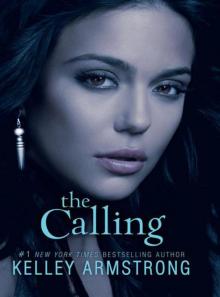 The Calling
The Calling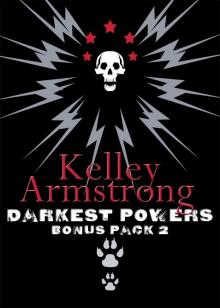 Darkest Powers Bonus Pack
Darkest Powers Bonus Pack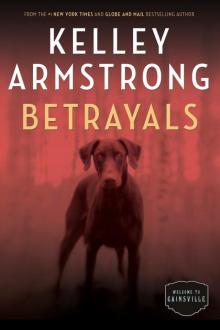 Betrayals
Betrayals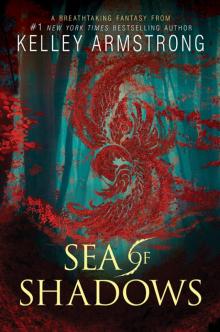 Sea of Shadows
Sea of Shadows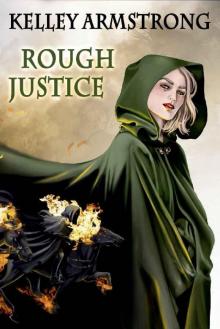 Rough Justice
Rough Justice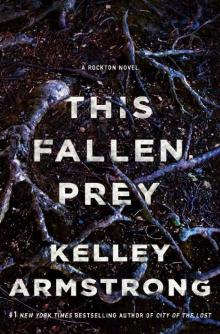 This Fallen Prey
This Fallen Prey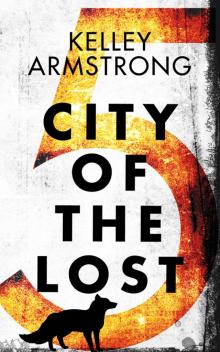 City of the Lost: Part Five
City of the Lost: Part Five Perfect Victim
Perfect Victim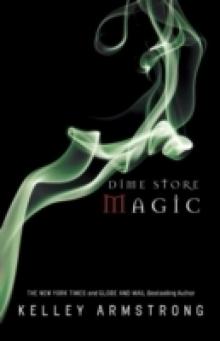 Dime Store Magic
Dime Store Magic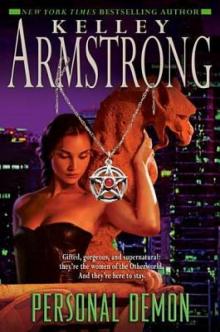 Personal Demon
Personal Demon Haunted
Haunted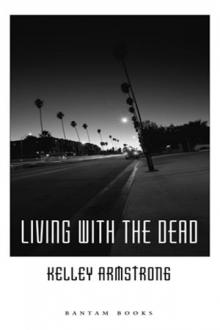 Living With the Dead
Living With the Dead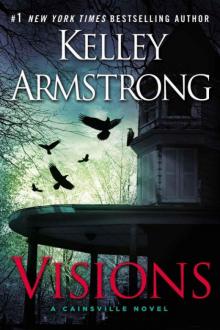 Visions
Visions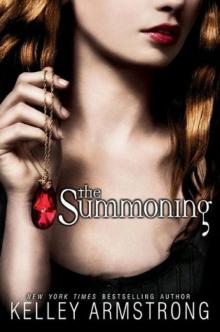 The Summoning
The Summoning Broken
Broken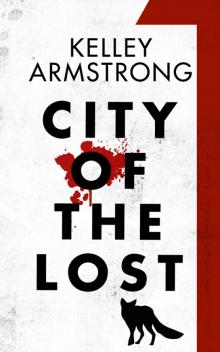 City of the Lost: Part One
City of the Lost: Part One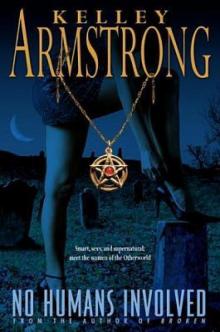 No Humans Involved
No Humans Involved The Awakening
The Awakening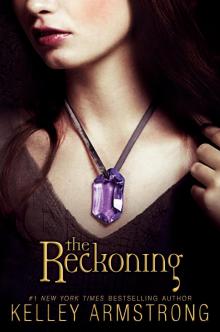 The Reckoning
The Reckoning The Gathering
The Gathering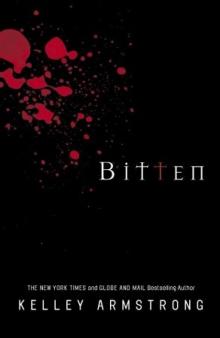 Bitten
Bitten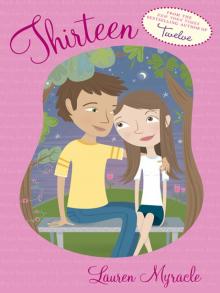 Thirteen
Thirteen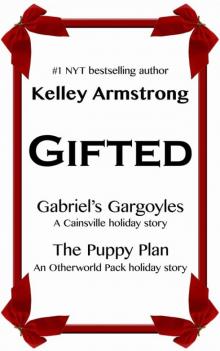 Gifted
Gifted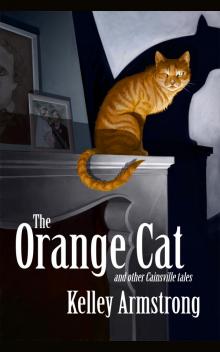 The Orange Cat and Other Cainsville Tales
The Orange Cat and Other Cainsville Tales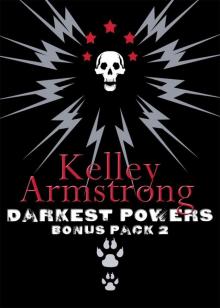 Darkest Powers Bonus Pack 2
Darkest Powers Bonus Pack 2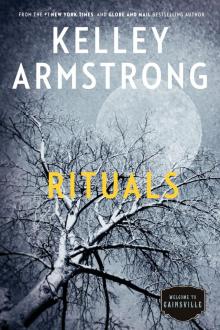 Rituals
Rituals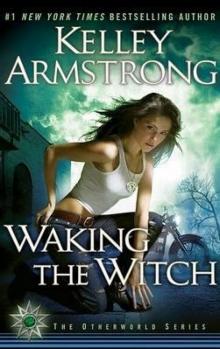 Waking the Witch
Waking the Witch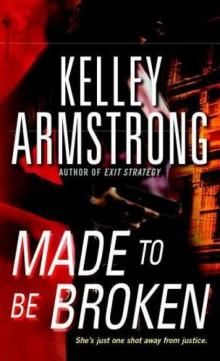 Made to Be Broken
Made to Be Broken Lost Souls
Lost Souls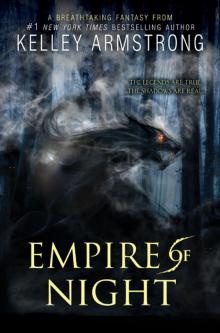 Empire of Night
Empire of Night Wild Justice
Wild Justice Double Play
Double Play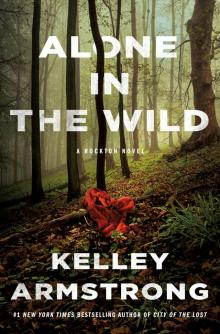 Alone in the Wild
Alone in the Wild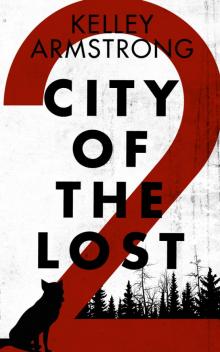 City of the Lost: Part Two
City of the Lost: Part Two A Stranger in Town
A Stranger in Town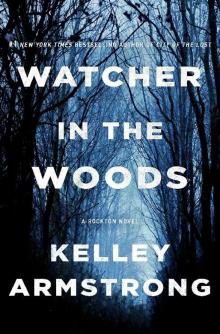 Watcher in the Woods: A Rockton Novel
Watcher in the Woods: A Rockton Novel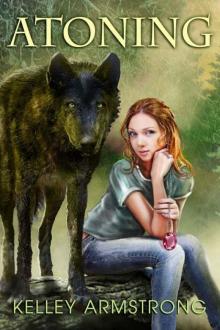 Atoning
Atoning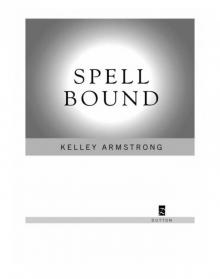 Spellbound
Spellbound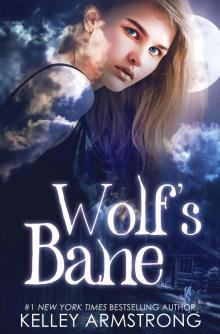 Wolf's Bane
Wolf's Bane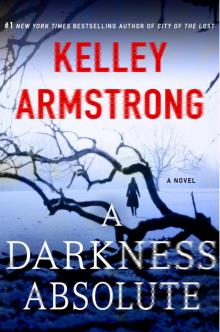 A Darkness Absolute
A Darkness Absolute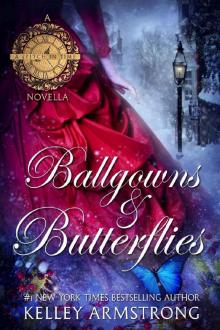 Ballgowns & Butterflies: A Stitch in Time Holiday Novella
Ballgowns & Butterflies: A Stitch in Time Holiday Novella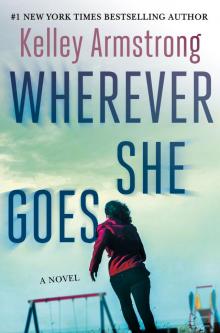 Wherever She Goes
Wherever She Goes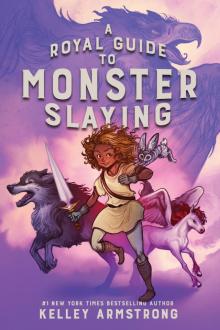 A Royal Guide to Monster Slaying
A Royal Guide to Monster Slaying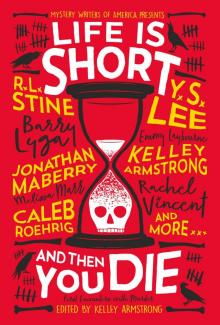 Life Is Short and Then You Die
Life Is Short and Then You Die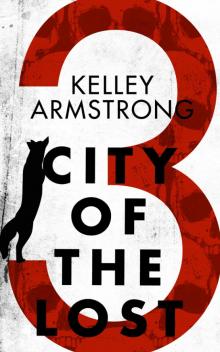 City of the Lost: Part Three
City of the Lost: Part Three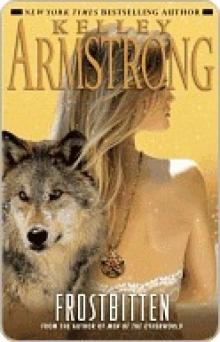 Frostbitten
Frostbitten A Stitch in Time
A Stitch in Time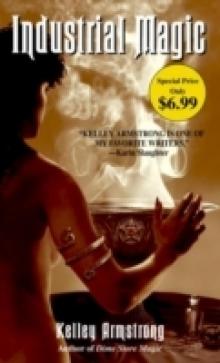 Industrial Magic
Industrial Magic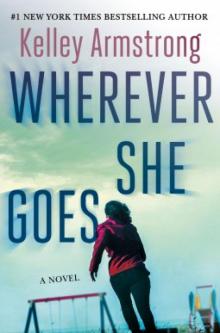 Wherever She Goes (ARC)
Wherever She Goes (ARC)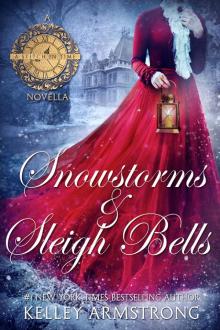 Snowstorms & Sleigh Bells: A Stitch in Time holiday novella
Snowstorms & Sleigh Bells: A Stitch in Time holiday novella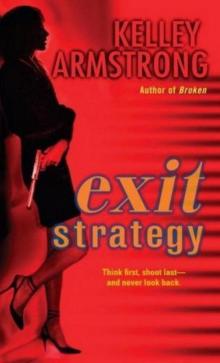 Exit Strategy
Exit Strategy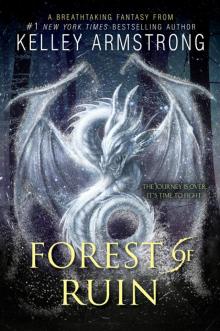 Forest of Ruin
Forest of Ruin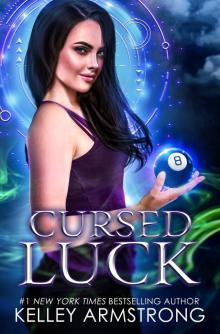 Cursed Luck, Book 1
Cursed Luck, Book 1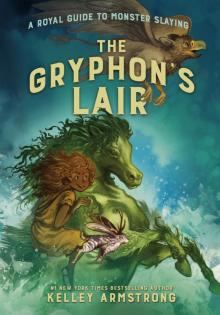 The Gryphon's Lair
The Gryphon's Lair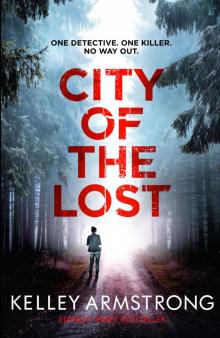 City of the Lost
City of the Lost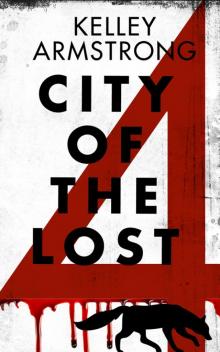 City of the Lost: Part Four
City of the Lost: Part Four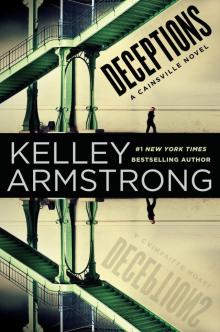 Deceptions
Deceptions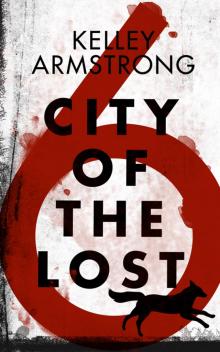 City of the Lost: Part Six
City of the Lost: Part Six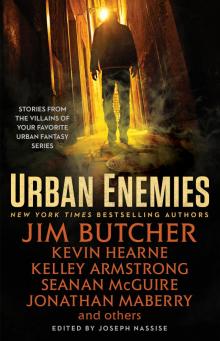 Urban Enemies
Urban Enemies Stolen
Stolen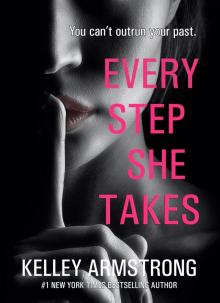 Every Step She Takes
Every Step She Takes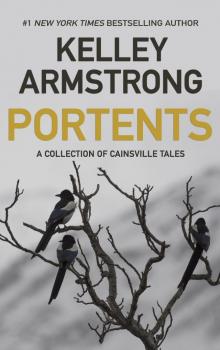 Portents
Portents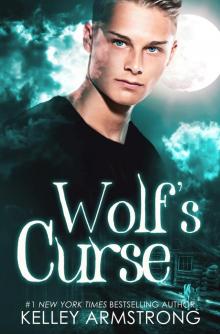 Wolf's Curse
Wolf's Curse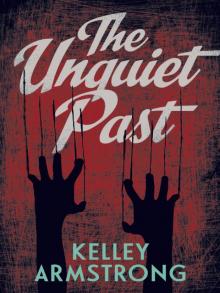 The Unquiet past
The Unquiet past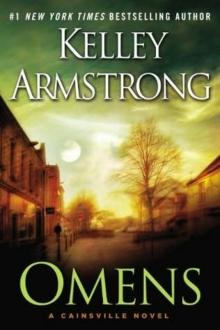 Omens ct-1
Omens ct-1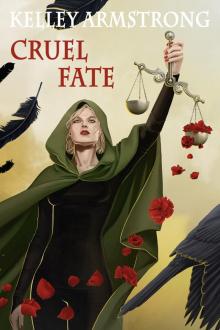 Cruel Fate
Cruel Fate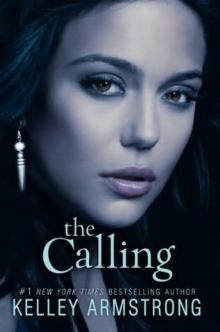 The Calling dr-2
The Calling dr-2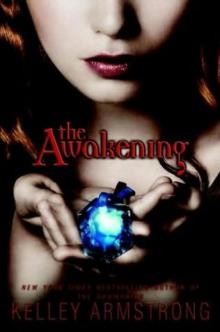 The Awakening dp-2
The Awakening dp-2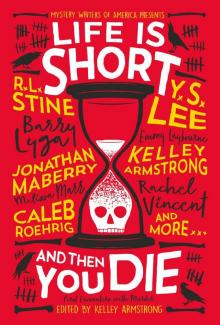 Life Is Short and Then You Die_First Encounters With Murder From Mystery Writers of America
Life Is Short and Then You Die_First Encounters With Murder From Mystery Writers of America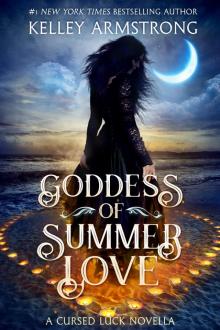 Goddess of Summer Love: a Cursed Luck novella
Goddess of Summer Love: a Cursed Luck novella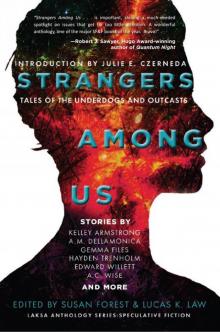 Strangers Among Us
Strangers Among Us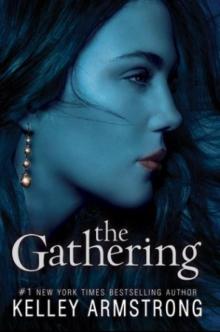 The Gathering dr-1
The Gathering dr-1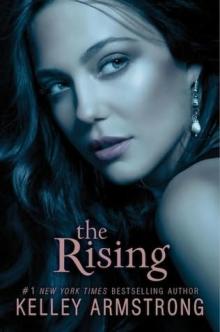 The Rising dr-3
The Rising dr-3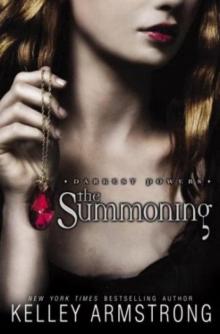 The Summoning dp-1
The Summoning dp-1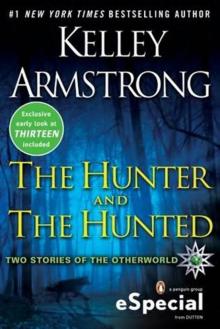 The Hunter And The Hunted
The Hunter And The Hunted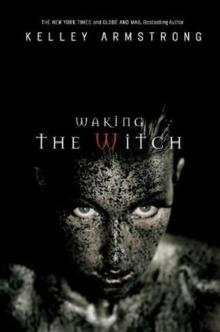 Waking the Witch woto-11
Waking the Witch woto-11